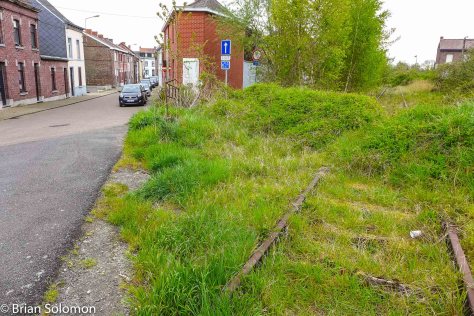International borders are often bad for railways.
An invisible political boundary (the dashed line on a map) can prove a greater obstacle than a towering mountain range when it comes to impeding railway operations.
In mid-April, my Irish friends and I explored the Gotthard Pass, where massive investment will soon make the old line over the mountain redundant as the new 35.5 mile Basistunnel beneath the Alps will divert most of the through traffic.
A week later I was exploring the border area between northern France and Belgian Wallonia with Mauno Pajunen.
This is in an area of relatively dense population that was once the center of a thriving coal mining community. Quiévrain, Belgium is a town located an hour or so from Brussels and is relatively near to large French cities of Lille and Paris.


Generally speaking SNCB (Belgian National Railways) provides an excellent service across Belgium, with most stations seeing at least an hourly passenger service and many lines operating with an even greater frequency.

At one time a through railway line connected Belgian cities of Brussels and Mons with the French city of Valenciennes via Quiévrain . Today, SNCB continues to operate a regular interval passenger service from Brussels to Mons with some trains continuing south to Saint Ghislain and Quiévrain.
But Quiévrain is the end of the line and the state of the station area is a sad reflection of better times now long gone.

Evidence of the old line remains and the tracks are still in place (although no longer connected).
The town is divided between Belgium and France, with the French town being called Quiéverchain. Differences in the price of tabacco and alcohol between the two countries has led to a thriving business on the Belgian side of the border.



It had been many years since you could take a train directly from Mons to Valencienes.
In theory, you can ride from Brussels to Valenciennes via a change of trains at Lille, but this is the long way around and impractical for regular travelers.

Elsewhere in Europe cross-border services have flourished, yet the end of track at Quiévrain clearly demonstrates how borders create barriers between population centers that need not exist.
Soon you will be able to travel faster than ever before from Zurich to Milan, but not by rail from Mons to Valenciennes!


Dear Brian:
Thank you for sharing this story and fascinating series of photographs., especially the last 3 or 4.
By the way, I wonder if you are ever going to share a series of photos of the wonderful Bridgeport, Connecticut railroad station. It was a “high-atmosphere” elevated station with ramps, a huge, counterbalanced roll-up chalkboard where train status was posted, and passenger tunnel to the eastbound tracks.
Trains in the ’50s and ’60s were pulled by a variety of pre- and McGiness-era power, plus RDC units. A very friendly (and patient) staff who tolerated my frequent visits.
Lots of memories…
Roger
Thank you for the detailed history!
The line between Blanc-Misseron (Quievrechain) France and Quiévrain was closed to passenger traffic from 3 June 1984 and to freight from 15 April 1992.
Valenciennes – Blanc-Misseron – Frontière – Quiévrain (Belgique) (13 km)
The former tram Valenciennes – Blanc-Misseron (Quiévrechain) : 11 km : ran from 1883 – 20 April 1965.
From Blanc-Misseron, the line continued 1.6 km across the border to the Gare de Quiévrain (the courtyard in front of the station building as shown in your pictures), where the French tramway connected with an isolated steam line of the Belgian SNCV: 1.6 km : from 1890 to 2 September 1939.
On the Belgian side, SNCV electric trams reached Quiévrain from Mons on 30 October 1949. The line was however cut back two stsaions from 2 July 1966 and the remainder closed completely from 15 March 1970. I reached Quiévrain by tram from Mons in 1963, but sadly did not know that I could have walked the mile to Blanc-Misseron and continued to Valenciennes on the fabulously antiquated trams of the Chemin de Fer Economiques du Nord.
There is indeed much history there, and many memories,